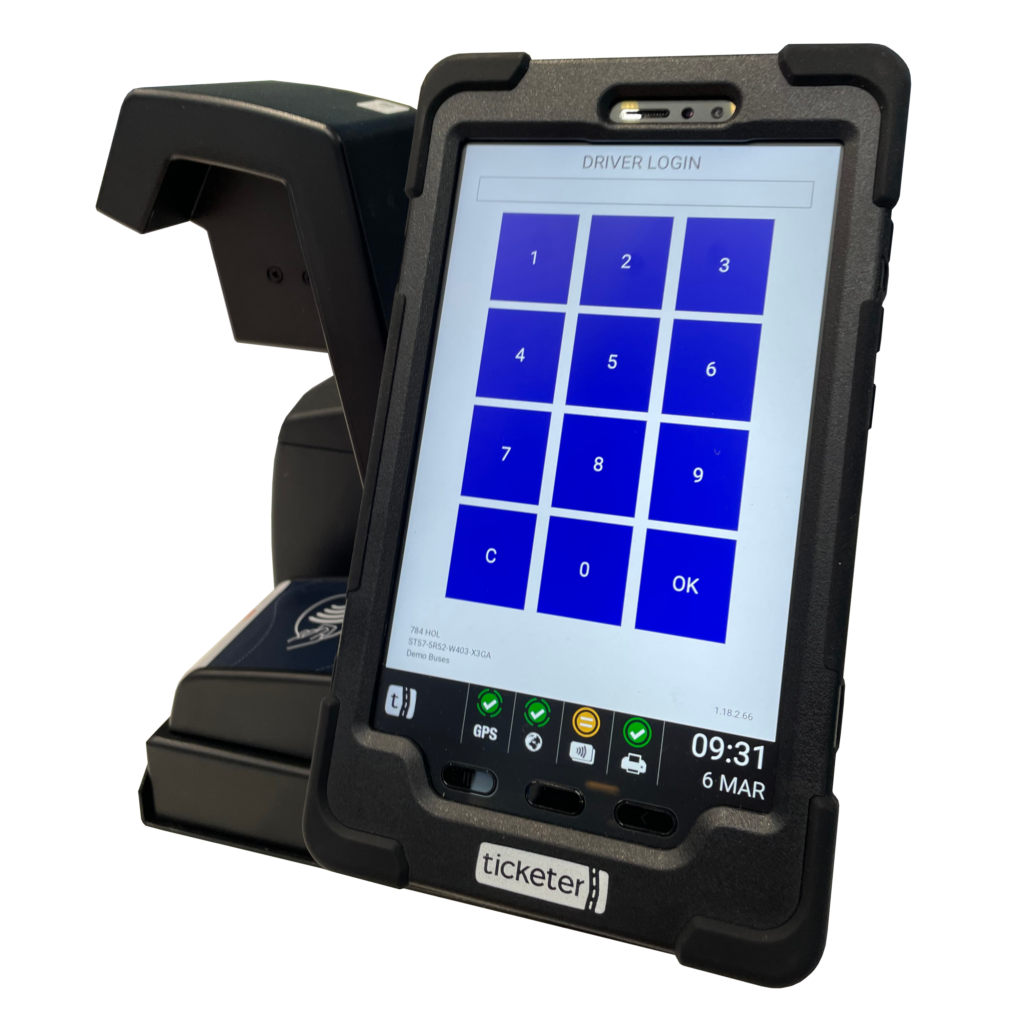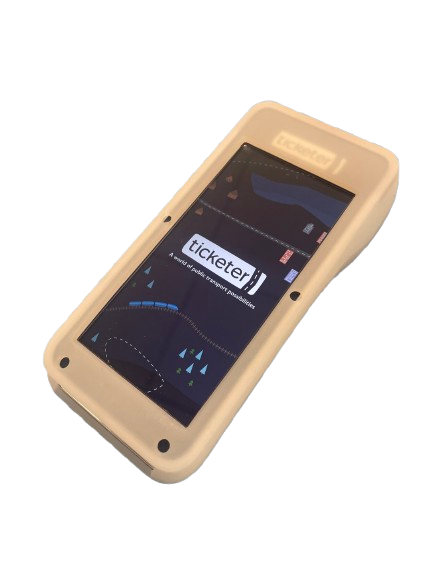Ahead of the ALBUM 2025 conference, we caught up with BUSES magazine to discuss the innovations on show at our stand. You can read feature below or if you’re a BUSES magazine subscriber. click here to read the full issue.
Visitors to stand 10 at the ALBUM conference will be treated to a first look at Ticketer’s latest innovations, developed in response to customer feedback and designed to improve efficiency and support operators in delivering seamless passenger experiences.
 Among Ticketer’s forward-thinking advancements are a new two-way voice communication solution – set to revolutionise how drivers and controllers stay connected – and the unveiling of Passenger Manifests, which will simplify the ticketing experience by facilitating both pre-booked travel and walk-up ticket sales whilst allowing real-time views of boardings versus expected occupancy, all on the same device.
Among Ticketer’s forward-thinking advancements are a new two-way voice communication solution – set to revolutionise how drivers and controllers stay connected – and the unveiling of Passenger Manifests, which will simplify the ticketing experience by facilitating both pre-booked travel and walk-up ticket sales whilst allowing real-time views of boardings versus expected occupancy, all on the same device.
Adam Toone, Ticketer Chief Commercial and Operations Officer, discusses the enhancements on show.
Voice Communication Prototype
 For operators, maintaining effective communication between drivers and control teams is essential for service reliability, efficiency and safety. In response to the limitations of traditional radio systems, Ticketer is developing a solution which will facilitate both two-way voice communication between the control room and drivers as well as voice broadcasts on the next generation TK300, by leveraging the driver console’s built-in speakers and microphone.
For operators, maintaining effective communication between drivers and control teams is essential for service reliability, efficiency and safety. In response to the limitations of traditional radio systems, Ticketer is developing a solution which will facilitate both two-way voice communication between the control room and drivers as well as voice broadcasts on the next generation TK300, by leveraging the driver console’s built-in speakers and microphone.
This solution will offer significant advantages over conventional radio systems; including less hardware in the driver cabin, the elimination of expensive radio frequency licenses, wider coverage given it will urn on network signal, plus the ability to send targeted, time-specific messages versus only being able to broadcast en masse.
Adam Toone highlights how this development addresses key industry challenges: “Many operators struggle with existing communication solutions. Some are using radio technology that no longer meets their needs, others are tied to legacy systems they haven’t upgraded due to cost and some have never had a radio system in place because of financial or logistical barriers. Our upcoming solution will provide a cost-effective and easy-to-deploy alternative that improves both operational efficiency and safety.”
By integrating this functionality into the Ticketer next generation TK300 ETM, they’ll eliminate the need for additional on-bus hardware, simplifying implementation while improving accessibility. Unlike traditional radio systems which can be geographically limited, Ticketer’s solution ensures reliable communication with less interference across wider networks as long as there is network coverage, enabling further reaching communication.
The Ticketer voice solution is also built on the framework of their existing text-based Driver Messaging feature and will offer the same flexibility in how and when messages are delivered. Operators will be able to send audio broadcasts to specific drivers, services, depots or individual vehicles, ensuring that communication is relevant and efficient.
“Traditional radio systems send the same message to everyone, regardless of whether it’s relevant to them. Our solution allows operators to tailor communication, ensuring the right messages reach the right people at the right time,” Toone explains.
Messages can also be set to activate and expire at specific times, ensuring that critical updates, for example road closures and diversions on specific routes, are only sent when necessary. Drivers can listen to broadcasts hands-free, ensuring that safety remains a priority, while also having the option to replay messages if needed when it is safe to do so.
A key capability of the Ticketer solution is also the facilitation of two-way communication, allowing drivers to call control room staff directly via their TK300s.
“This feature means that both drivers and control room teams can initiate direct voice calls, just as they would on a mobile phone. Control teams will receive alerts for incoming calls via the Ticketer Portal, and calls can be logged for auditing and review,” says Toone.
Passenger Manifests: A New Era for Pre-Booked Travel
For operators handling pre-booked tickets such as coach, school and Demand Responsive Transport (DRT) services, real-time passenger visibility as well as speedy and seamless ticketing is a growing priority. Addressing this need, Ticketer is launching their Passenger Manifests feature which will allow drivers to track expected and actual passenger boarding seamlessly, and accept pre-booked travel tickets as well as walk-up ticket sales, all within the same device.
 Initially released on the Ticketer Handheld before being developed for their TK300 driver console, this solution will provide drivers with a real-time view of occupancy, allowing them to see how many passengers are scheduled to board at each stop. By scanning a QR code, pre-booked passengers will be automatically marked as boarded, highlighting any outstanding boardings.
Initially released on the Ticketer Handheld before being developed for their TK300 driver console, this solution will provide drivers with a real-time view of occupancy, allowing them to see how many passengers are scheduled to board at each stop. By scanning a QR code, pre-booked passengers will be automatically marked as boarded, highlighting any outstanding boardings.
“Operators managing pre-booked travel need clear visibility of who is expected to be on board, particularly for services like school transport or airport shuttles,” Toone explains. “Passenger Manifests provide this clarity, ensuring drivers always have accurate and up-to-date information on boardings.”
One of the key capabilities of Ticketer’s solution is its ability to support both pre-booked and walk-up passengers on a single device. Many ticketing systems in the industry handle either pre-booked manifests or walk-up ticketing, but not both. By integrating them into a single solution, Ticketer again removes the need for multiple devices in the driver cab, making operations simpler and more efficient.
Adam elaborates: “Operators shouldn’t have to use two separate systems – one for pre-booked travel and another for walk-ups. Our approach brings both together, reducing complexity and making life easier for drivers and passengers alike.”
Beyond improving operational efficiency, the system is designed for flexibility. It features two-way API integration, allowing seamless updates from third-party reservation and booking platforms. This means that if a booking is modified then the updated details will be reflected immediately, ensuring that all records remain accurate and up to date.
“Real-time integration with external booking systems is a game-changer for operators,” says Toone. “It ensures that any last-minute changes – such as a passenger switching to a later service or a new booking being added – are captured efficiently, preventing any confusion or errors.”
By automating the boarding process and ensuring that real-time updates are available to drivers, Passenger Manifests not only improve efficiency but also enhance the overall passenger experience. Passengers benefit from smoother boarding processes, fewer delays, and greater confidence in their bookings.
Transforming Public Transport Operations
With these upcoming solutions, Ticketer is delivering practical, high-impact innovations that address real-world operator challenges. These solutions reduce complexity, improve safety, and enhance efficiency, ensuring that both drivers and control teams have the tools they need to operate smoothly.
“Listening to our customers has always been at the heart of what we do,” Toone states. “These innovations are a direct response to industry feedback, and we’re excited to showcase them at ALBUM. We believe they will bring real value to operators, improving day-to-day operations while also enhancing the passenger experience.”
 Be sure to visit Ticketer at stand 10 to demo their latest innovations and other forward-thinking solutions. For further questions on the above, please email info@ticketer.co.uk.
Be sure to visit Ticketer at stand 10 to demo their latest innovations and other forward-thinking solutions. For further questions on the above, please email info@ticketer.co.uk.

